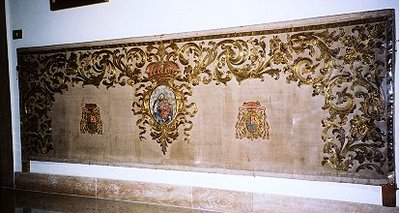The Importance of the Antependium
 An altar frontal with the arms of 'Henry IX' (the Cardinal Duke of York)
An altar frontal with the arms of 'Henry IX' (the Cardinal Duke of York)The great thing about blogging is that you never know what you'll end up posting. Until I accidentally found the reflections penned by Dom Daniel Augustine Oppenheimer, CRNJ (Prior and Founder of the Canons Regular of the New Jerusalem based in Saint Louis), I never thought I'd end up considering the humble altar frontal (biretta tip to the New Liturgical Movement).
According to Oppenheimer, 'from Christian antiquity the altar has always been understood as symbolic of Christ Himself. In both the eastern and western Churches the altar has been the object of artistic embellishment for the sake of increasing faith regarding its holiness...The antependium is an essential liturgical accoutrement whose absence form churches now is but one more sign of liturgical ignorance.'
His argument is that an unveiled altar diminishes belief in its holiness (rather like an unveiled tabernacle). Oppenheimer also regrets the disappearance (from the sixteenth century onwards) of cancelli (choir curtains) and vela (altar hangings) because 'the mystery occuring on the altar had to be shielded from the eyes of men.' This tradition was particularly rich in England.
It's well worth a read!
Labels: Liturgy



0 Comments:
Post a Comment
<< Home